Egypt, located in Northeastern Africa, offers a perfect blend of sunshine and rich ancient history. With a population of over 98 million, it is surrounded by the Mediterranean Sea and the Red Sea.
The capital city, Cairo, situated on the banks of the River Nile, is a must-visit. It boasts remarkable Ottoman landmarks like the Egyptian Museum and Muhammad Ali Mosque, among other attractions.
Plan your dream trip to Egypt with this comprehensive guide that covers everything you need to know.
Ultimate Guide: Must-See Attractions and Activities in Egypt
Welcome to the ultimate guide for exploring Egypt's top attractions and engaging in unforgettable activities. From ancient wonders to vibrant cities, Egypt offers a wealth of experiences for travelers seeking adventure, history, and culture. Whether you're drawn to iconic landmarks like the Pyramids of Giza or the bustling streets of Cairo, this guide will provide you with essential information to make the most of your visit to this captivating country. Get ready to embark on a journey through time and immerse yourself in the wonders of Egypt.
What tourist attractions are there to visit in Egypt?
Egypt, a country steeped in ancient history and captivating cultural heritage, offers a myriad of tourist attractions that attract travelers from all corners of the world. From the iconic Pyramids of Giza to the stunning temples of Luxor and the vibrant Red Sea beaches, Egypt is a treasure trove of wonders waiting to be explored. Let's delve into some of the most remarkable tourist attractions in Egypt.
1. The Pyramids of Giza
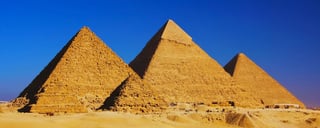
No trip to Egypt is complete without a visit to the Pyramids of Giza, one of the Seven Wonders of the Ancient World. Located on the outskirts of Cairo, this magnificent complex consists of three main pyramids: the Great Pyramid of Khufu, the Pyramid of Khafre, and the Pyramid of Menkaure. These monumental structures were built as tombs for the pharaohs and are a testament to the incredible engineering skills of the ancient Egyptians. Visitors can explore the interiors of some pyramids and marvel at the Sphinx, an iconic statue with the body of a lion and the head of a human.
2. The Town of Luxor
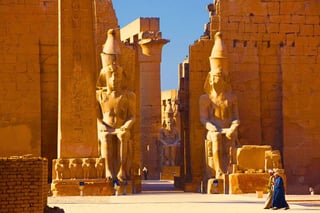
Situated on the banks of the Nile River, Luxor is often referred to as the world's greatest open-air museum. It was the ancient city of Thebes and served as the capital of Egypt during the New Kingdom period. Luxor is home to an abundance of archaeological sites, temples, and tombs that offer a glimpse into Egypt's rich history. Visitors can explore the massive Temple of Karnak, a vast complex of sanctuaries, pylons, and obelisks, or visit Luxor Temple, which is beautifully illuminated at night. Additionally, Luxor's West Bank is home to the Valley of the Kings, where the tombs of pharaohs, including Tutankhamun, were discovered.
3. Luxor's Karnak Temple and the Valley of the Kings
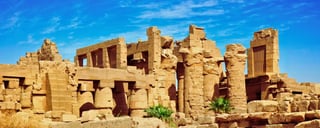
The Temple of Karnak, located within the city of Luxor, is an awe-inspiring ancient complex and one of Egypt's most significant religious sites. Spanning over 200 acres, it is the largest religious structure ever built. The temple is dedicated to the worship of the god Amun and features impressive columns, halls, and statues. The Avenue of Sphinxes, a path connecting Karnak Temple with Luxor Temple, is a must-see attraction.
The Valley of the Kings, situated on the West Bank of Luxor, is a burial ground for many pharaohs from the 16th to the 11th centuries BC. Visitors can explore several elaborately decorated tombs, including the famous tomb of Tutankhamun, which was discovered virtually intact in 1922. The intricate wall paintings and artifacts found within the tombs provide invaluable insights into ancient Egyptian funerary practices and beliefs.
4. Abu Simbel – The Temples That Moved
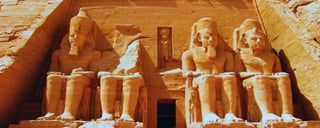
Located near the southern border of Egypt, Abu Simbel is home to two majestic temples carved into the mountainside. The Great Temple of Ramses II and the smaller Temple of Hathor were originally built in the 13th century BC but were relocated in the 1960s to save them from flooding caused by the construction of the Aswan High Dam. The temples are adorned with colossal statues and intricate reliefs, showcasing the power and grandeur of ancient Egypt's pharaohs.
5. Popular Red Sea Beaches & Resorts

Egypt's Red Sea coastline offers a paradise for beach lovers and diving enthusiasts. Destinations such as Hurghada, Sharm El Sheikh, and Marsa Alam boast stunning beaches, crystal-clear waters, and vibrant coral reefs teeming with marine life. Visitors can indulge in a variety of water sports, including snorkeling, scuba diving, and windsurfing. The Red Sea resorts also offer luxurious accommodations, world-class dining options, and a vibrant nightlife scene.
6. Cairo's Egyptian Museum
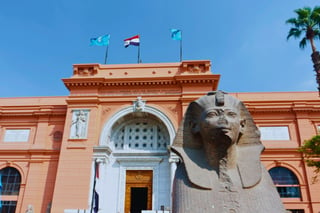
In the heart of Cairo, the Egyptian Museum stands as a treasure trove of artifacts from ancient Egypt. With over 120,000 exhibits, it houses the world's most extensive collection of pharaonic antiquities. Visitors can marvel at iconic artifacts like the golden death mask of Tutankhamun, intricate jewelry, mummies, and ancient statues. The museum provides a fascinating journey through Egypt's rich history, offering a glimpse into the lives of pharaohs and the ancient civilization that thrived along the Nile.
7. Aswan and the Philae Temple
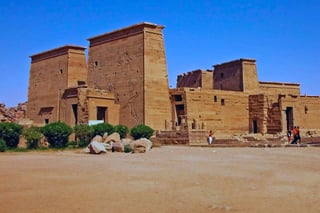
Located in southern Egypt, Aswan is a city renowned for its stunning natural beauty and historical sites. One of the highlights of Aswan is the Philae Temple, dedicated to the goddess Isis. Situated on an island in the Nile, the temple was relocated to its current location after the construction of the Aswan High Dam. Visitors can explore the beautifully preserved temple complex, featuring breathtaking colonnades, hieroglyphics, and intricate carvings.
8. The White Desert

For those seeking a unique and surreal landscape, the White Desert is a must-visit destination. Located in the western part of Egypt's Sahara Desert, this otherworldly landscape is characterized by its white limestone rock formations, shaped by wind erosion over thousands of years. The desert's surreal formations, resembling mushrooms and other curious shapes, create an ethereal atmosphere. Visitors can camp overnight under the starry sky, creating an unforgettable experience.
9. Alexandria's Catacombs of Kom El Shoqafa
On the Mediterranean coast lies the city of Alexandria, known for its rich historical significance. One of the city's most intriguing attractions is the Catacombs of Kom El Shoqafa, an underground necropolis dating back to the 2nd century AD. These catacombs were designed as a final resting place for multiple family members and showcase a fusion of Egyptian, Greek, and Roman architectural styles. Visitors can explore the maze-like tunnels, admire intricate carvings, and observe ancient burial rituals.
10. The Temples of Luxor's East Bank
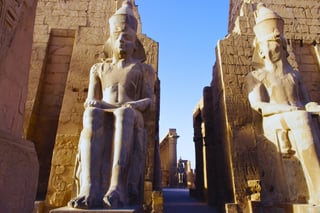
While Luxor's West Bank is renowned for its Valley of the Kings, the East Bank is equally captivating. The Luxor Temple, located in the heart of the city, is a testament to ancient Egyptian architecture. Illuminated at night, the temple exudes a magical ambiance. Nearby, the Avenue of Sphinxes connects Luxor Temple to the Temple of Karnak, creating an impressive pathway lined with sphinx statues. This ancient route is a popular spot for a leisurely stroll, immersing visitors in the grandeur of ancient Egypt.
11. Dahab and the Blue Hole
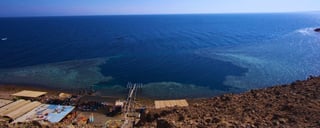
Dahab, a coastal town on the Sinai Peninsula, is a haven for divers and snorkelers. One of the main attractions in Dahab is the Blue Hole, a natural underwater sinkhole that plunges to incredible depths. Its crystal-clear waters and vibrant coral reefs make it a paradise for underwater exploration. Diving enthusiasts can discover an abundance of marine life, including tropical fish, sea turtles, and colorful corals. The relaxed atmosphere and stunning coastal scenery make Dahab an ideal destination for both adventure seekers and those seeking tranquility.
Conclusion
Egypt's tourist attractions offer a rich tapestry of history, culture, and natural beauty. From the awe-inspiring Pyramids of Giza to the ancient temples of Luxor and Abu Simbel, each site reveals a unique aspect of Egypt's fascinating past. The Red Sea beaches and resorts provide an idyllic setting for relaxation and water sports, while destinations like Cairo and Alexandria offer a glimpse into the vibrant urban life and coastal charm of the country. Exploring Egypt is a journey through time, immersing oneself in the wonders of an ancient civilization that continues to captivate the imagination of visitors from around the world.
Egyptian Cuisine: What traditional foods should I try?

Egyptian cuisine boasts a rich blend of Eastern Mediterranean flavors, and its roots are a source of great pride for the people of Egypt. The culinary traditions of this ancient land feature an array of aromatic spices, vibrant vegetables, and luscious fruits sourced from the fertile Nile Valley and Delta, resulting in a burst of delightful flavors.
When exploring the culinary delights of Egypt, there are a few dishes that are a must-try. One such dish is Koshary, a delectable combination of rice, chickpeas, lentils, and pasta. Each ingredient is individually cooked before being skillfully mixed together and generously topped with a cumin-infused tomato sauce.
Another highlight of Egyptian cuisine is the mixed grill, a tantalizing assortment of charcoal-grilled meats, including succulent kebabs and falafels. Molokhia, a dish featuring Egyptian spinach, is also a popular choice for those seeking a unique and flavorful experience.
While savoring the diverse flavors of Egyptian cuisine, it is important to ensure that the food is cooked thoroughly, particularly when it comes to meat. Additionally, it is advisable to refrain from consuming tap water as it may not be safe for drinking purposes.
Let your taste buds embark on a journey through Egypt's culinary landscape, where centuries of tradition and the bounties of the Nile come together to create a truly unforgettable dining experience.
Best Time to Travel: When is the optimal time to visit Egypt?
If you're planning a trip to Egypt, the best time for tourists to visit is typically between September and April. During these months, the weather is more pleasant and conducive to exploring the country's magnificent attractions.
It is highly recommended for visitors to avoid the period from April to October. These months can be extremely hot, with temperatures reaching levels that are simply unbearable. Considering that Egypt is predominantly a desert country, with approximately 96% of its land covered in arid landscapes, the scorching heat can be quite intense.
It's important to note that there can be a significant drop in temperatures during the night, with a difference of around 20 degrees Celsius. As a result, it would be wise to pack some warm clothing to ensure your comfort during the cooler evenings.
One advantage of visiting Egypt is the minimal rainfall it experiences throughout the year. You won't need to worry about carrying a rain jacket or being caught in sudden showers while exploring the country's wonders.
By planning your visit between September and April, you can enjoy the best of Egypt's attractions while avoiding the discomfort of extreme heat and heavy rainfall.
Tourist Safety: Is Egypt a safe destination for tourists?
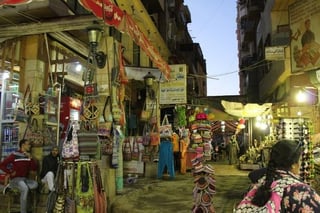
Visiting the country is indeed a safe choice for travelers. However, it is always wise to prioritize safety and take necessary precautions while enjoying your holiday.
When exploring local markets, especially during nighttime, it is essential to remain vigilant and cautious of potential scammers, pickpockets, and incidents of petty crime. Unfortunately, such issues can occasionally arise in public spaces throughout Egypt.
To ensure the security of your belongings, it is recommended to leave valuable items at home or securely store them in a hotel safe. Additionally, it is advisable to carry only the necessary amount of cash required for your daily expenses.
Language and Currency: What are the primary language and currency in Egypt?

Egypt, a country located in North Africa, has Arabic as its official language. The majority of its population, approximately 90%, follows the Islamic faith, while the remaining portion adheres to Christianity.
When visiting Egypt, it is important to be aware of the official currency, which is the Egyptian pound (EGP). It may be necessary to exchange your money accordingly. One Egyptian pound is divided into 100 piastres, available in both coin and note denominations.
If you require cash during your stay, ATMs can be easily found in major cities such as Alexandria and Cairo. However, it is advisable to ensure you have sufficient funds before venturing into remote areas, as finding an ATM might prove challenging.
In Egypt, tipping holds significant cultural importance. It is customary to tip around 10% of the bill amount, as many workers rely on tips as part of their income. Bearing this in mind during your interactions and transactions is considered appropriate and respectful.
Visa Requirements: Will I need a visa to enter Egypt?
To visit Egypt, it is necessary to obtain a visa.
If you're planning a holiday in Egypt for a duration of up to 30 days, you can conveniently apply for an Egypt eVisa through Visa First. The Egypt eVisa serves as a single-entry permit, allowing you to stay in the country for a maximum of 30 days. Once approved, the eVisa remains valid for a period of 90 days, giving you flexibility in planning your travel.
eVisa Requirements: What are the prerequisites for obtaining an Egypt eVisa?
- Passport from an eligible country
- Visit must be for tourist purposes only
- Required documents:
- Completed questionnaire
- Digital photograph against a white background
- Copy of the bio page of your passport
- Passport must be valid for at least six months upon arrival in Egypt
- Proof of travel itinerary and hotel bookings needed, including details of planned places to visit.
Eligible Countries: Which countries are eligible for an Egypt eVisa?
The following is a comprehensive list of countries that are eligible for Egypt eVisa:
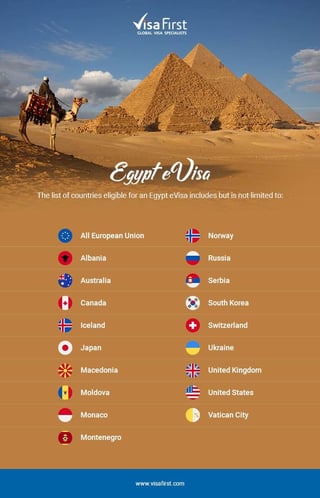
Processing Time: How long does it take to process an Egypt eVisa?
Experience a streamlined and efficient application process that saves you time and hassle. Whether you choose to apply for Egypt eVisa online or through other channels, rest assured that your application will be swiftly processed. In most cases, online applications are finalized within a mere three working days from the moment of submission.
Unlock incredible value with Visa First as we offer budget-friendly rates for Egypt eVisas. With prices as low as €84, you can embark on your Egyptian adventure without breaking the bank. Trust in our expertise to handle your visa needs smoothly and affordably.
Applying During COVID-19: Can I still apply for an Egypt eVisa amidst COVID-19?
Good news! The Egyptian government has lifted the travel ban. To enter Egypt, you will need a negative PCR test taken within 72 hours of your arrival. If you're departing from London, Paris, Frankfurt, or North and South America, the test must be taken within 96 hours. Upon arrival, you must fill out a declaration form with health insurance details and your location in Egypt.
COVID-19 Restrictions: What are the current COVID-19 restrictions in Egypt?

COVID restrictions in Egypt:
- Face masks are mandatory in closed public areas, taxis, and public transport.
- Public transportation is limited, especially between 00:00 and 04:00.
- Social distancing guidelines are in effect.
- Restaurants, shops, clubs, and cafes have restricted opening hours to mitigate COVID risk.
- No COVID restrictions for visitors near tourist areas like South Sinai, the Red Sea, and Matrouh.
Note: Restrictions may change, so check the latest COVID-19 guidelines before traveling to Egypt.
Like
Dislike
To obtain a Egypt eVisa
- Step1: Complete the online application by providing your passport details.
- Step2: Submit payment online using a credit card.
- Step3: Monitor your email for confirmation of payment and receipt of your eVisa, which will be sent electronically.

Comment